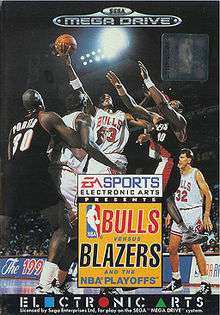Bulls vs. Blazers and the NBA Playoffs
Bulls vs. Blazers and the NBA Playoffs, later released in Japan as NBA Pro Basketball: Bulls vs Blazers and the NBA Playoffs, is a 1992 basketball video game developed by Electronic Arts and released for the Super Nintendo Entertainment System. A later Mega Drive version was released under the title Bulls versus Blazers and the NBA Playoffs,[1] later released in Japan as NBA Playoffs: Bulls vs Blazers.
| Bulls vs. Blazers and the NBA Playoffs | |
|---|---|
 European Mega Drive cover featuring (left to right): Terry Porter, Horace Grant, Scottie Pippen, Clifford Robinson,
Kevin Duckworth and Will Perdue | |
| Developer(s) | Electronic Arts |
| Publisher(s) | Electronic Arts |
| Composer(s) | Michael Bartlow |
| Series | NBA Playoffs |
| Platform(s) | Sega Mega Drive/Genesis, Super NES |
| Release | 1992 |
| Genre(s) | Sports |
| Mode(s) | Single-player, Multiplayer |
The game is the sequel to Bulls vs Lakers and the NBA Playoffs. Like its predecessor, the game's title refers to the previous season's NBA championship series, the 1992 NBA Finals match-up between the Chicago Bulls and Portland Trail Blazers.
It is the first EA basketball game to feature in-game advertisements featuring the company's "EA Sports" logo.
Gameplay
The game can be played in various ways: players can play against each other, or against the computer. Games against the computer were divided into two modes, "Exhibition" or "Playoffs". Players can pick from one of the 16 teams that had competed in the 1992 NBA Playoffs. Games can be configured for 2, 5, 8 or 12 minute quarters.
The game was the first NBA game to feature the entire rosters of each NBA Franchise at the time, including the recent expansion teams of Minnesota, Orlando, Miami, and Charlotte, as well as the full rosters of both All Star teams from the 1992 NBA All-Star Game.[2]
The game is also notable for being the last official NBA video game to feature Charles Barkley, as he began holding out on signing a licensing agreement due to the lack of pay to retired players from the National Basketball Players Association the following year.[3][4]
Marquee Shots
Each team featured a star player with a signature move known as a "Marquee Shot". These shots were difficult to perform, and only occurred when a player would press the "A" button under the right circumstances. A list of each player's "Marquee Shot" was posted in the instruction manual, and some fan favorites included: Michael Jordan's "Free-Throw Line" dunk, Larry Bird's "Turn-Around" Fadeaway Jumper, Magic Johnson's "Fake No-Look Pass" Lay Up, Tim Hardaway's "UTEP Two-step" Killer Crossover, Shawn Kemp's "Off-the-Glass" Back-Jam, Larry Nance's "Around the World" Slam, Mookie Blaylock's "Spinning 360" Layup, Billy Owens' "Alley Oop Tomahawk" Jam, and Karl Malone's "Special Delivery In-Your-Face" Slam Dunk. [5]
Teams
Eastern Conference:
- Boston Celtics
- New Jersey Nets
- New York Knicks
- Philadelphia 76ers
- Chicago Bulls
- Cleveland Cavaliers
- Detroit Pistons
- Indiana Pacers
- Milwaukee Bucks
- Atlanta Hawks
- Washington Bullets
- Miami Heat
- Orlando Magic
Western Conference:
- Charlotte Hornets
- Minnesota Timberwolves
- Denver Nuggets
- Dallas Mavericks
- Houston Rockets
- Utah Jazz
- Phoenix Suns
- Seattle SuperSonics
- Los Angeles Lakers
- Los Angeles Clippers
- Golden State Warriors
- Sacramento Kings
- San Antonio Spurs
- Portland Trail Blazers
References
- The game itself uses "VS.". Unsure whether to use or not.
- "Bulls Vs Blazers Player Manual, Page 56" (PDF). Classic Reload.
- "NBA Live 95 is the Greatest Basketball Video Game of All-Time". NBA.com.
- "Charles Barkley will not appear in 'NBA 2K' unless game publisher pays NBPA". Sporting News.
- "Bulls Vs Blazers Player Manual, Page 27" (PDF). Classic Reload.